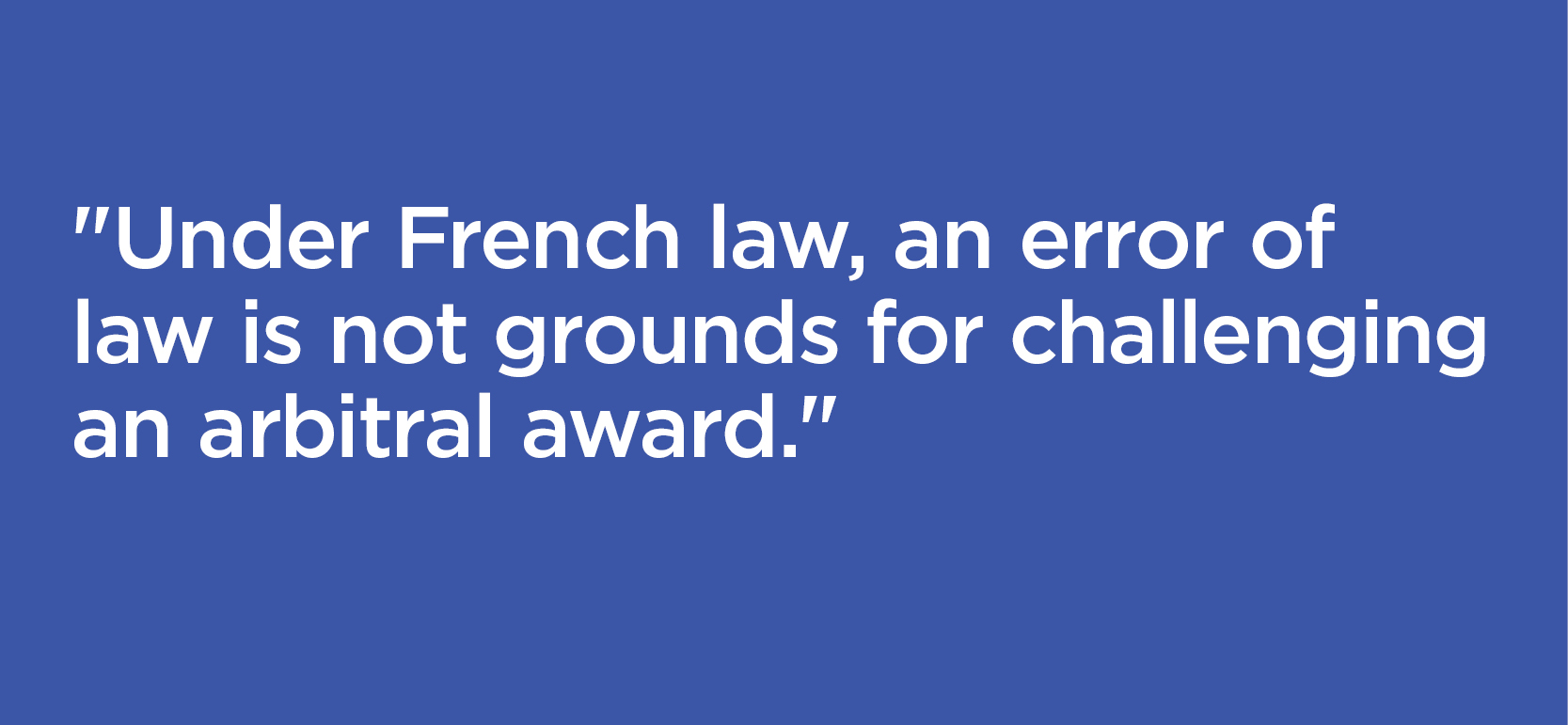“Those who cannot remember the past are condemned to repeat it.” —George Santayana
Nowhere does Santayana’s famous maxim hold truer than in the tale of Kout Food. Much like the case of Dallah before it, the Kout saga has mired French and English courts in direct conflict, leaving behind no small amount of legal uncertainty, notably in the matter of determining the governing law of an arbitration agreement.
The tale of Kout Food Group (KFG)—a Kuwait-based restaurant business that franchises a number of popular fast-food and fast-casual restaurants in the Middle East and the U.K.—stems from a franchise-development agreement into which the company entered in 2001. To help settle a dispute over the pact, a franchisee a decade later initiated an International Chamber of Commerce (ICC) arbitration against the parent company of the franchisor—that is, Kout—not the franchisor with whom it had entered into the underlying agreement. The arbitral tribunal, based in Paris, issued an award in December 2013 in favor of the franchisee for nearly $7 million.
This January, following an attempt by the franchisee to enforce the arbitration award before the English courts, the English Court of Appeal, applying English law, refused to recognize and enforce that award, citing the Parisian tribunal’s lack of jurisdiction over Kout, the parent company.
In the meantime, Kout sought to annul the award before the French courts. This June 23, the Paris Court of Appeal, applying French law, dismissed the application and affirmed the arbitral tribunal’s jurisdiction.
These diametrically opposed judgments serve as a stark reminder that the major cultural differences among various jurisdictions may in fact hamper the effectiveness of arbitral proceedings. The sort of legal uncertainty exemplified by these divergent judgments is something that must be anticipated by parties whose contracts contain an arbitration agreement.
A Common Commercial Context
The parties to the franchise-development agreement cited above were Al-Homaizi Foodstuff Company (AHFC), the franchisor, which following a corporate restructure in 2005 became a subsidiary of Kout Food Group; and Kabab-Ji, the franchisee.
The development agreement included a plethora of typical contractual clauses that wouldn’t have been out of place in other similar pacts. It contained, inter alia, an English choice-of-law clause, an arbitration clause providing for ICC arbitration in Paris, an entire agreement clause, a contractual definition of the agreement that referred to all provisions, and a No Oral Modification clause providing that any agreement had to be signed in writing. A further stipulation: The agreement had to be interpreted and executed in good faith.
The arbitration clause itself was relatively complex, stating that the arbitral tribunal should apply not only the agreement’s provisions but also principles of law generally recognized in international transactions, taking into consideration other countries’ mandatory provisions. It also made clear, though, that under no circumstances could the tribunal apply any rule that would contradict the terms of the agreement.
KFG, since its corporate restructuring, was consistently involved in the performance of the franchise-development agreement. When it came time to renew the agreement in 2011, however, KFG elected not to do so and entered into discussions to terminate it. In response, Kabab-Ji initiated an ICC arbitration against KFG in order to obtain damages. At no stage was AHFC, the KFG subsidiary, party to the proceedings.
In 2017, a final award was handed down ordering KFG to compensate Kabab-Ji to the tune of almost $7 million. The tribunal unanimously found that French law governed the arbitration agreement and considered KFG party to it by virtue of “novation” under English law.
Challenging the jurisdiction of the tribunal—and taking issue with the very existence of a mechanism of novation under English law—KFG sought to set aside the award in Paris, the seat of arbitration, and challenged its enforcement in London, thereby setting the scene for a cross-Channel collision of the two jurisdictions.

The English Approach
Under English law, recognition or enforcement of an international arbitration award can be refused where the arbitration agreement is not valid under the law to which the parties subjected it—or, failing any indication, under the law of the country in which the award was made.
Where required to determine the governing law of an arbitration agreement, English courts will thus carry out the following inquiry: First, the court will examine whether there is an express choice. Should there be, the court need look no further. Absent an express choice, the court must determine whether there is an implied choice, which can be inferred either from the law of the arbitral seat or the law applicable to the underlying contract. Under English law, there is a rebuttable presumption of an implied choice in favor of the governing law of the underlying contract.
Although—at least in principle—a choice-of-law clause found in the underlying contract will not automatically be extended to the arbitration agreement, in this case the English Court of Appeal concluded that the cumulative effect of the contract provisions amounted to an express choice of English law as the arbitration agreement’s governing law. There was, therefore, no need to proceed: The fact that the seat of the arbitral tribunal was in Paris made no difference.
Having established this, the English Court of Appeal looked at whether the arbitration agreement could be extended to KFG under English law. The court, affirming the U.K. Supreme Court’s position laid down in 2018 in Rock Advertising, found this impossible due to the No Oral Modification clause. According to Rock Advertising, such clauses can be set aside only if an estoppel can be shown. Specifically, it must be established that a party has engaged in words or conduct which unequivocally led to the belief that modification of the contract, notwithstanding the informal nature of the modification, was valid; more than a mere informal promise is required. The Court of Appeal found that no such estoppel could be established and refused enforcement of the award.
While there’s little doubt that the court carried out an unwavering application of English law here—and the restrictive conditions regarding the extension of the arbitration agreement were not met—the essential question of whether English law even applied to this issue is much less clear-cut. It’s unclear, for example, to what extent the arbitral tribunal could have anticipated this, especially given that Paris was the seat of the arbitration, and analyzing the contract terms required complex interpretation.
Before crossing the Channel to examine the French approach, it’s worth noting that the English courts took the time to fire a shot across their Gallic counterparts’ bow: “I would hope,” the judge stated, “that the firm opinion that I have expressed and am expressing as to the effect and impact of English law will not go unnoticed in the French courts, given that on any basis English law is central to the decision.”
The French Approach
True to form, the Paris Court of Appeal adopted an entirely different interpretation from that of the English, one very much in line with its well-known transnational approach to international commercial arbitration. The French court’s judgment was also a retort to the English court’s caution, stating that its power would not “be limited by the existence of foreign decisions interpreting the Agreement and the arbitration clause and applying English law to them.”
Concerning international arbitration, French courts consider the validity of the arbitration agreement by virtue of règles matérielles (substantive rules), which are applied independent of any national legal system. Unlike English courts, French courts do not inquire into the governing law per se, but instead simply look to the common intention of the parties.
French law does allow parties to derogate from this rule by expressly choosing the governing law of the arbitration agreement. However, in this case the Paris Court of Appeal found that the various provisions of the agreement did not suffice to establish that the intention of the parties was to extend the English choice-of-law clause to the arbitration agreement. Moreover, the parties had expressly designated Paris as the seat of arbitration. The Paris court therefore held that the parties had made no express choice regarding the governing law of the arbitration agreement and rejected the application of English law.
Having established this, the French court considered the jurisdiction of the arbitral tribunal. In doing so, it applied another of its règles matérielles, according to which an arbitration agreement shall be extended to parties that are directly involved in the performance of a contract and any associated disputes, and are therefore aware of its existence and scope, notwithstanding the fact that they’re non-signatories. In light of KFG’s involvement in the performance and termination of the franchise distribution agreement, the court agreed with the arbitral tribunal’s decision and affirmed its jurisdiction.
The Paris Court of Appeal also held that the No Oral Modification clause could not prevent the extension of the arbitration agreement to KFG, given that the franchise agreement stipulated that the arbitral tribunal was also required to apply all principles of law generally recognized in international transactions.

As to the lack of a mechanism of “novation” under English law (the nonexistent principle on which the arbitral tribunal based its decision), it’s important to note that under French law an error of law is not grounds for challenging an arbitral award. The French court simply verified whether the arbitral tribunal had fulfilled its mission by applying the law designated by the parties, and refused to review the merits of the award.
Aftermath: Reconciling the Irreconcilable
The judgment of the Paris Court of Appeal remains subject to appeal to the French Cour de Cassation, but the risk of an overruling is low. Similarly, although Kabab-Ji has issued an application for permission to appeal to the English Supreme Court, it seems unlikely that the English Court of Appeal’s judgment will be overturned. In light of these irreconcilable decisions, it’s therefore important to take stock of the situation and anticipate the possible consequences.
Parties rarely explicitly choose the governing law of their arbitration agreements, and these two diametrically opposed results highlight the legal uncertainty they might face when it comes to enforcing or challenging the enforcement of arbitration awards.
Furthermore, unlike the French courts, and despite stating that in principle there is no automatic extension of a choice-of-law clause to an arbitration agreement, it is clear that the English courts may now have a greater tendency to consider that the law applicable to an underlying contract extends to the arbitration agreement. This is, in part, because the commercial context of this particular dispute is relatively commonplace and the relevant contractual provisions in play are typical. As such, the conclusion reached in this saga is likely to occur in other cases, and where the governing law of a contract is English law, any misapplication of English law by an arbitral tribunal may lead to a refusal of enforcement of an award before the English courts.
The legal uncertainty could have been somewhat mitigated by taking care to initiate arbitration against both the franchisor and its parent. However, where this is not possible, for economic reasons in particular, one’s legal strategy should be adapted accordingly and the arbitral tribunal’s attention should be clearly drawn to difficulties in conflicting approaches.
In any arbitration, it is essential to ensure, to the best of your ability, that any arbitral award in your favor will be enforceable. In order to provide legal certainty, arbitral tribunals should have their attention drawn to the applicable rules in any state where the award is likely to be enforced. In addition, during contractual negotiations, thorough analysis of the governing law of the underlying contract will enable you to anticipate any potential enforcement obstacles.
Article co-authored with Vanessa Thieffry, Erwan Robert, Mathilde Adant, and Adam Calloway, associates at Reed Smith Paris.
Peter Rosher, Partner at Reed Smith, is a dual qualified (English Solicitor/French Avocat) lawyer with a strong experience in International Arbitration advising clients on contentious issues as well as providing extensive advisory services in relation to "live" major projects. He has particular experience in international commercial and investment arbitration and dispute resolution, with specific knowledge in international engineering, construction and energy.
Clément Fouchard, Partner at Reed Smith, specialises in international commercial and investment arbitration. He has a strong experience advising on major litigation and arbitration proceedings, especially in the construction, energy and infrastructure, mining, defence and distribution sectors. In addition to his experience as counsel, Clément also acts as an arbitrator in domestic and international arbitrations (ICC).


















